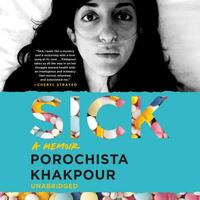You need to sign in or sign up before continuing.
Take a photo of a barcode or cover
I agree with all of the other two star reviews of this book. It was an arduous read, as I imagine living though this process must have been a constant struggle.
Iranian American novelist Khakpour describes in excruciating detail her fight against an unknown disease, which turned out to be late stage Lyme disease. Much of her battle was in getting the correct diagnoses and disregarding the Dr's who told her that her pain was psychological. For readers who enjoyed "Everything Happens for a Reason: And Other Lies I've Loved" by Kate Bowler.
I read an advance copy and was not compensated.
I read an advance copy and was not compensated.
challenging
medium-paced
I was disappointed in this book because I felt it didn't increase my empathy, it rather decreased it. Intellectually, I could think about empathy for this woman and her story, but in my heart, I didn't feel it as I was reading her story. A tumbling tale of addiction and problematic relationships, it becomes more and more confusing the deeper you get into it. For a while the story-following-the-setting works, but by 3/4 of the way through the book, the places all seem interchangeable, as do the men, and the only constancy is that her life is falling apart.
Two things are particularly striking to me about the story: that she never stops to take care of herself, for one moment, and that none of the other people in the book are particularly real. There is never a time when she goes: oh, I need to do things differently, I'm on too many pills, what I'm doing isn't working. She goes jumping from one bandwagon to another, looking for a miracle cure, which I understand the desperation for, but also seems, externally, as so evidently a rabbithole. And the other people in her story, the boyfriends, the friends, the strange connections she makes with people of dubious reliability and care...none of them really strike you, other than perhaps as flashing a million alarm bells. Even her parents are rather two-dimensional.
It's unfortunate, because these stories are important, but I would recommend Abby Norman's book, if you're looking for something more analytical, Sonya Huber, if you're looking for more insight and wild beauty; also Julie Devaney, Anna Lyndsey, or Tessa Miller.
Two things are particularly striking to me about the story: that she never stops to take care of herself, for one moment, and that none of the other people in the book are particularly real. There is never a time when she goes: oh, I need to do things differently, I'm on too many pills, what I'm doing isn't working. She goes jumping from one bandwagon to another, looking for a miracle cure, which I understand the desperation for, but also seems, externally, as so evidently a rabbithole. And the other people in her story, the boyfriends, the friends, the strange connections she makes with people of dubious reliability and care...none of them really strike you, other than perhaps as flashing a million alarm bells. Even her parents are rather two-dimensional.
It's unfortunate, because these stories are important, but I would recommend Abby Norman's book, if you're looking for something more analytical, Sonya Huber, if you're looking for more insight and wild beauty; also Julie Devaney, Anna Lyndsey, or Tessa Miller.
Moderate: Addiction, Drug abuse, Sexual assault, Suicidal thoughts, Medical content
I liked some things about this book, and I hated some things about this book.
Things I liked:
- The author doesn't sugar coat her bad decisions that have definitely contributed to her almost constant state of illness. She owns them.
-She let the book go where it went. Instead of trying to write the book she thought she was going to write, she stayed true to the story that actually unfolded.
Things I hated:
- Sarah Lawrence College should adopt a new motto: Give us all your money and we'll ruin your life! I really have strong negative feelings about that place.
- The author could have been such a strong role model for young women of color. She represents a traditionally oppressed group of women. And instead she does drugs and bounces from partner to partner and basically sets a negative example at every turn. Super disappointing.
Things I liked:
- The author doesn't sugar coat her bad decisions that have definitely contributed to her almost constant state of illness. She owns them.
-She let the book go where it went. Instead of trying to write the book she thought she was going to write, she stayed true to the story that actually unfolded.
Things I hated:
- Sarah Lawrence College should adopt a new motto: Give us all your money and we'll ruin your life! I really have strong negative feelings about that place.
- The author could have been such a strong role model for young women of color. She represents a traditionally oppressed group of women. And instead she does drugs and bounces from partner to partner and basically sets a negative example at every turn. Super disappointing.
This is an excellent (and frankly missing) narrative of illness. Khakpour’s writing is thoughtful and evocative, even as it is clearly stretched through the holes of her sickness and discomfort and hospital visits. The beginning and end of this book are so powerful. The middle feels mired in her experience of suffering and confusion, but that felt authentic so I didn’t mind the ways the story unmoored. This is her life, after all. I appreciated the window in.
(-1 for the idea that you need to get a dog from a breeder if you’re ill. The idea that shelter dogs are more risky than breeder dogs is a farce.)
SPL 2019 book bingo: book about disability
(-1 for the idea that you need to get a dog from a breeder if you’re ill. The idea that shelter dogs are more risky than breeder dogs is a farce.)
SPL 2019 book bingo: book about disability
“It reminded me that illness will always be with you as long as life is with you. And tragedy will be with you too.”
The point of this memoir was to bring light to an otherwise misunderstood disease -- that part I get. But I had trouble connecting with the Khakpour, despite being an Iranian American woman myself, and as a result, had trouble ultimately CARING about her ups and downs, feeling her various addictions throughout also exacerbated her late stage Lymes disease, and never really enjoyed reading it.
This book was excellent! It was incredibly sad to read about her suffering but at the same time it was inspiring because despite everything she went through she never gave up. She had her moments when she was very close to giving up but she never did. It was amazing to read. I learned a lot about Lyme disease and how it affects your entire body and mind. It's shocking what one tick can do to you. This is a very important read.
I think that books about chronic illness and the experiences of women of colour accessing healthcare are essential, but I did not like this book. Here’s the thing. I think that explorations of trauma and illness, of gender and illness, of race and illness, are all so important. I think exploring women’s illness, and illnesses such as Lyme, and calling out how they are often characterized as psychiatric is needed. I think that avoiding narratives of sick then well, of triumph over what is in fact just a stage of life and inevitable outcome of living is good. This book was too much of a hot mess. I think that this was largely due to poor writing and editing. Khakpour was not well when she wrote, and writing was one of the challenges she identified during periods of illness. But where was her editor in all of this? I found this book almost impossible to follow. People did not stand out to me, when exes and friends re-emerged in later chapters, I could not remember who they were. There were no real human connections communicated in this memoir and it made it hard to connect as a reader. Also, I don’t know that organizing chapters by cities made all that much sense. I would have picked years or months or symptoms instead. Also, I didn’t find the writing about romances or addiction or heartbreak or illness to be evocative; I was not transported by her prose. Finally, I think I had a hard time relating to the author, who I found to be kind of enamoured of her own image as the almost heroin-chic waif on trend in the 90’s. Thin, jittery, jumping from rich boyfriend to rich boyfriend, and seemingly expecting to be looked after by everyone in her life. I didn’t understand how she found all of these wealthy people to provide so much to her (money, care, housing, travel, energy), but it was surreal and off-putting to me. An aside: what was the one sentence in brackets at the end of the book about bisexuality? It was so odd, and again, so poorly edited, relationships were explored in detail, so many, and then at the end she was like “there were women too, but I didn’t think I’d mention it but also should mention it.” I didn’t get this book.
If I’d believed the reviews on this book I probably wouldn’t have read it, it’s only because I have a specific interest in women’s experiences of seeking treatment for chronic illness that I read it despite the rating, maybe even as a contrast to other books.
But now that I’ve read it I’m reading the reviews again and feeling defensive of the book. I mean maybe I can understand if you don’t like the structure or the fact that the book is not very informative, but I found this so well written and evocative of the loneliness of illness. The reviews that find her attitude towards medical staff or even just her personality off-putting and therefore unreliable - idk, they seem to support the idea that you have to be a certain kind of person or to behave in a certain way to get respectful treatment. I liked her honesty and her ambivalence and her disinterest in seeking help because it’s a punish - I’ve felt that way too.
Having read some more reviews I understand the concerns around what could be interpreted as her promotion of some quackery and maybe that’s what this comes down to. I read those sections with disinterest and probably would feel differently if I was concerned about the impact of that.
But now that I’ve read it I’m reading the reviews again and feeling defensive of the book. I mean maybe I can understand if you don’t like the structure or the fact that the book is not very informative, but I found this so well written and evocative of the loneliness of illness. The reviews that find her attitude towards medical staff or even just her personality off-putting and therefore unreliable - idk, they seem to support the idea that you have to be a certain kind of person or to behave in a certain way to get respectful treatment. I liked her honesty and her ambivalence and her disinterest in seeking help because it’s a punish - I’ve felt that way too.
Having read some more reviews I understand the concerns around what could be interpreted as her promotion of some quackery and maybe that’s what this comes down to. I read those sections with disinterest and probably would feel differently if I was concerned about the impact of that.







